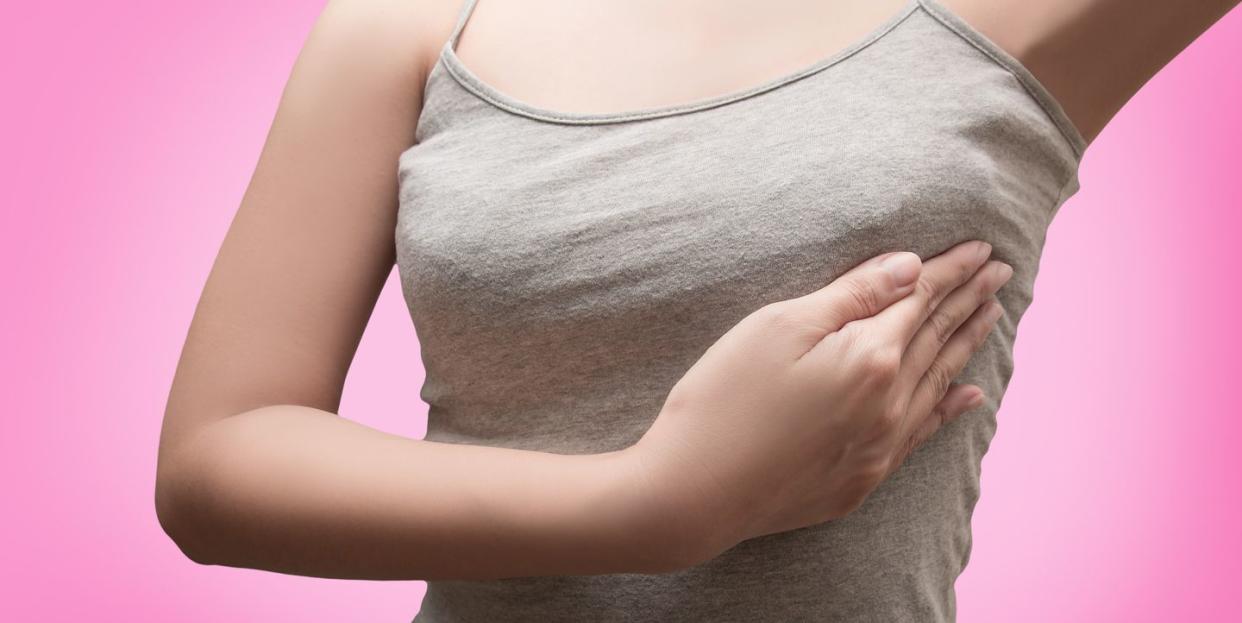4 Reasons For Nipple Pain, Explained By A Doctor

If you’re a woman, and you’ve got breasts, there is no doubt that you’ve experienced nipple pain at some point in your life. Sometimes it's a tenderness that is times with your period. Other times it’s an itchiness that you can’t seem to satiate. And occasionally it's an unexplained flash of heat that comes out of nowhere. But regardless of whether or not you’ve experienced nipple pain in the past, every time you experience it again, it can be more than a little bit scary.
But the fact is, nipple pain is fairly normal. In fact, 70 percent of women have reported some type of breast pain — known medically as mastalgia — at some point in their life. But luckily, most of that pain is benign. Of the 70 percent of women who have experienced breast pain, only 15 percent require medical attention.
Still, it’s normal to feel anxious when you feel a little pain or tenderness on or around your nipple. So what could be causing that pain? To get those answers, Woman’s Day spoke with Dr. Amna Husain, a board-certified pediatrician, lactation consultant, and the founder of Pure Direct Pediatrics. Ahead, she lays out exactly why you may be feeling nipple pain. But remember: When in doubt, it’s always best to talk to a doctor.
Infection
There are a lot of different infections that can cause havoc on our nipples, such as bacterial infections, staph infections, fungal candida, and viral infections. Typically, the pain associated with an infection is a heat-like sensation around the nipple. That’s because there’s increased blood flow to the area, which your body dispatches in order to fight the infection.

“Fungal infections in particular can brew over time and may not be painful at first,” Dr. Husain says, claiming that fungal infections tend to start beneath the breast, where there’s a fold in the skin. (Fungi love warm, damp areas, like skin folds.) Other infections can be caused from everything from breastfeeding to not washing your bras enough. If you think you have an infection, it’s a good idea to chat with your medical provider, as prescription topicals may be the best course of action for treatment.
Dermatitis
If you’re prone to eczema or psoriasis, it’s possible that you experience flare ups around your nipples and breasts. But if you’re not prone to these skin conditions, it could just be a good ‘ol fashioned allergic reaction. “The skin on your breasts is sensitive, and it can react to new detergents, soaps, or sprays you may be using,” Dr. Husain says.

If that’s the case, it’s a good idea to discontinue the new spray or detergent and see if the rash clears up. (It should only take 24 to 48 hours to do so.) If it lingers, contact your doctor. In rare cases, a rash could point to Paget’s disease — a form of cancer that resembles a rash.
Hormones
“Hormonal changes tend to cause heightened nipple sensitivity,” Dr. Husain says. This could be around your period, when you start a new pill, during pregnancy, or immediately following delivery. The pain is more like irritation — your nipples may be more sensitive to touch, or have a tingling sensation when exposed to friction. Dr. Husain says that the pain tends to ebb and flow with hormonal fluctuations. But if it sticks around for more than a couple of weeks, it’s best to give your doctor a ring and let them know.
Breastfeeding
There are a whole host of issues that can arise with breastfeeding. Poor positioning or latch can cause pain — and Dr. Husain is quick to remind women that this isn’t always their fault. “Your infant can have a poor latch or a tongue tie that has nothing to do with you,” she says. So don’t allow guilt to take over if you’re finding that you’re having that issue. The pain is enough to deal with.

A plugged duct is another painful occurrence that happens often with breast feeding mothers. “There might be situations where milk leaks and gets clogged,” Dr. Husain says. “Your body then treats the blockage as a foreign body, which causes a painful inflammatory response.”
The best way to deal with this is warm compresses to help loosen the blockage. You can also massage your breast in the shower to help remove it — or enlist the help of your infant. “Massage your breast as you’re feeding,” Dr. Husain says. “The baby’s sucking pressure can help to loosen the blockage.” If you’re having trouble with breastfeeding, it might be a good idea to enlist the help of a lactation consultant who can help you and your baby.
You Might Also Like


